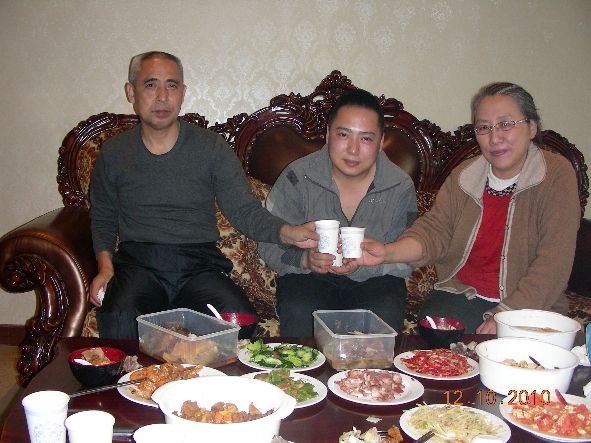| Hindustan Times |
| March 28, 2015 |
| By Sutirtho Patronobis |
 |
|
| Hada (L), his son Uiles and wife Xinna had a brief reunion in December 2010 before they were separately detained. (S Mongolian Human Rights Information Centre) |
In December, a Chinese Mongolian teenager was exonerated from a crime he had committed in 1996. But it was a little too late: Huugjilt had been executed for the crime — the rape and murder of a woman in a public toilet — the same year. China’s state-controlled newspapers and news agencies splashed the news for days. Commentaries talking about judicial reproach and the rule of law in China were being written even three months later.
At about the same time last year, another ethnic Mongolian man from Inner Mongolia, Hada (61), was released from detention after spending most of the last 20 years in jail. He was arrested and jailed in 1996 for inciting separatism, spying and supporting the Southern Mongolian Democratic Alliance (SMDA).
But the story about the freeing of Hada, one of China’s longest-jailed political prisoners — whom rights group Amnesty International had called a "prisoner of conscience" — received zero attention from Chinese media. According to Hada, the reason could be the fact that the authorities do not want the Chinese to hear his story.
"The main objective (of the Chinese authorities) during the 19 years I was in prison was to force me through physical and mental torture to admit to the alleged crimes. As a result, I became physically disabled, suffering from multiple complications. All kinds of torture methods, including use of toxic drugs, were applied to break me down mentally — so I would be forced to write some statements of their choosing. On two occasions, I was placed under solitary confinement for 99 days," Hada told HT in a rare interview.
According to the New York-based Southern Mongolian Human Rights Information Centre (SMHRIC), Hada’s release from jail was more symbolic than anything else. "In fact, Hada was not allowed to go home. He was transferred to a residential-like yet heavily guarded apartment that was owned by the Public Security Bureau on November 17, 2014, from the "black jail" in suburban Hohhot (Inner Mongolia’s capital), where he was placed under extra-judicial detention for four years after completing his 15-year jail term on December 10, 2010," Enghebatu Togochog, SMHRIC director, told HT.
Ethnic Mongolians, who are now less than 20% of the roughly 24 million population of Inner Mongolia, have long complained about discrimination. They say that their traditional grazing lands, where wild horses would once roam, have been ruined by reckless mining, and that Beijing has been marginalising their culture and language — reducing the locals to a tourism troupe.
Hada, who ran the Mongolian Academic Bookshop in Hohhot before being picked up by the police, was talking about these very issues at the time of his arrest. After the arrest, his family’s tough times began as well.
"Over the past 19 years, my wife was arrested multiple times. The latest arrest resulted in a three-year jail term with five years’ reprieve that has not expired yet. Our bookstore had been shut down numerous times. It is still closed today. My family had no choice but to make ends meet with money borrowed from others. My son was expelled from school under false charges, and was sentenced twice on trumped-up accusations," Hada said.
Even now, his interaction with his family is sporadic and restricted. "On December 9, 2014, he was allowed to meet his wife Xinna, son Uiles, brother Yushan and sister Yuyue in the apartment. Although brief and sporadic, meetings with family members and relatives are allowed under tight surveillance. However, no true family reunion has yet taken place in their own home," said Togochog. Physical torture and isolation from his family, according to Hada, were just some of the methods employed by the authorities to break his spirit. Both carrot-and-stick policies were used: sometimes, the authorities would treat him in surprisingly nice ways.
"During my 15 years of imprisonment, (the authorities) repeatedly attempted to force me to change my thoughts and beliefs. They told me over and over that my main goal should be to change what I think and what I believe. In Chinese prisons, there is a song with lyrics that go "the goal of prison is to change thoughts and beliefs."
Again, during the imprisonment in the "black jail", they attempted to force me to give up my thoughts and beliefs, to be obedient, to cooperate with them, and to be subservient to the Communist Party of China."
The situation in Inner Mongolia continues to be bad, Hada said. "The most critical issue the Southern Mongolians (which is how he describes ethnic Mongolians from the province) are facing is how to achieve genuine autonomy. Southern Mongolians have been completely deprived of their political rights and right to autonomy."
The interview was conducted over email





 Beyond
Great Walls: Environment, Identity, and Development on the Chinese
Grasslands of Inner Mongolia
Beyond
Great Walls: Environment, Identity, and Development on the Chinese
Grasslands of Inner Mongolia China's
Pastoral Region: Sheep and Wool, Minority Nationalities, Rangeland
Degradation and Sustainable Development
China's
Pastoral Region: Sheep and Wool, Minority Nationalities, Rangeland
Degradation and Sustainable Development The
Ordos Plateau of China: An Endangered Environment (Unu Studies on
Critical Environmental Regions)
The
Ordos Plateau of China: An Endangered Environment (Unu Studies on
Critical Environmental Regions)